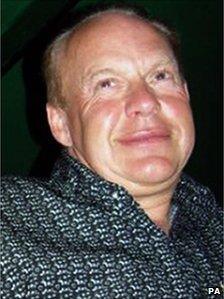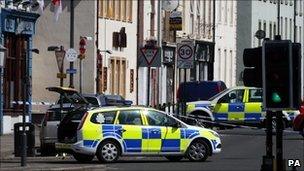Bird inquest: Should paramedics be sent into danger?
- Published

Derrick Bird shot dead 12 people in Cumbria in June 2010
One of the most contentious issues raised during the inquest into Derrick Bird's killings was that ambulance crews were ordered to stay away from the scenes of the multiple shootings. So what could have happened differently?
On Wednesday, 2 June 2010, the sound of emergency sirens could be heard nearly everywhere in west Cumbria.
From the towns on the coast to the fells and valleys inland, emergency vehicles dashed to the area where Derrick Bird was on a murderous journey.
Before the emergency services realised the enormity of what the marauding gunman was doing, paramedics got to his victims swiftly.
The first three people shot dead by the 52-year-old were attended to in less than 22 minutes.
But once a major incident was declared - and crews were told to wait for the green light to go in - it took about two hours for medical help to reach many of the dead and injured.
The taxi driver's tenth victim was a young estate agent called Jamie Clark. The 23-year-old was shot dead as he sat in his smart car on the side of a country lane near Seascale.
'Bitter'
It's thought he tried to drive off after he was blasted by Bird's shotgun, but as his life ebbed away, his car swerved off the road and came to rest on its side against a hedge.
One of the first people to find him was Vivienne Tregiga. The PR consultant stayed with him for nearly an hour wondering why an ambulance crew didn't turn up.
She has been left feeling bitter and angry that medics were told to keep back.
"I'm furious about it quite honestly, because it was left up to people who didn't have enough training and equipment to help victims and I think that's appalling," she said.
"We all pay our taxes to get an emergency service and when there's an emergency they don't turn up."
There's no suggestion that any more of Bird's victims would have survived if paramedics were on site sooner.
But Vivienne Tregiga, who is trained in advanced first aid, says she would have acted differently if she was told not to expect help.
"We had enough guys who arrived at the scene and were quite eager to turn the car back on to its wheels and we would have done that if we had known the situation," she said.
"I know now that it wouldn't have made a difference to Jamie but I've spent all these months since the incident thinking I should have done that."
Health and safety
The head of the North West Ambulance Service, Peter Mulcahy, admits there is a huge tension among ambulance crews over the rules surrounding such an incident.
He told the inquest: "It is not in the make-up of ambulance staff not to go and help people."
But he said there was a real risk of sending people to their deaths, and the health and safety considerations of staff are paramount.
He added it was Parliament who decide health and safety statutes, and if a staff member got killed then it would leave the service open to charges of corporate manslaughter.
The next person shot by Derrick Bird that day was Harry Berger.
He was driving through the centre of Seascale when he had to reverse his car to let Bird past. He still remembers the look on the face of the man who tried to kill him.

Derrick Bird began his shootings in Whitehaven, before driving through the Lake District
"He was angry. He was puce in the face, he looked a bit sweaty, he was a man in a hurry", he said.
"But there was no urgency about anything he did. He didn't screech to a halt, he didn't spin his tyres to go away. He just calmly stopped, did his deed, and drove on again."
The 40-year-old was treated by local GPs and had to wait 90 minutes for an air ambulance to get to him. But he understands why the ground crews were held back.
"I understand the issues and I understand that changes have to be made and will be made. But if you don't know what's round the corner, do you really want to walk round that corner when there might be somebody there with a shotgun or a rifle? Perhaps not."
Mayhem
From Seascale, Bird drove on shooting more strangers randomly at point blank range.
In the beautiful valley of Eskdale his car was involved in numerous collisions and he eventually came to a halt on a track by a rocky stream near the Woolpack Inn at Boot.
Daytrippers who saw him there, and who were completely unaware of what he had been doing, tried to offer him help because he looked so flustered.
But he told them to keep away and made off into some nearby woods with one of his weapons.
Shortly afterwards a single shot was heard as Derrick Bird knelt down, put the butt of his rifle on the ground and the barrel against his head, having removed the silencer. He pulled the trigger and ended his own life.
A short time afterwards armed police finally caught up with him. Ambulance crews were soon told it was safe to deploy, to uncover the death and mayhem he'd left in his wake.
It was a trauma that will blight the lives of many people in west Cumbria for generations.